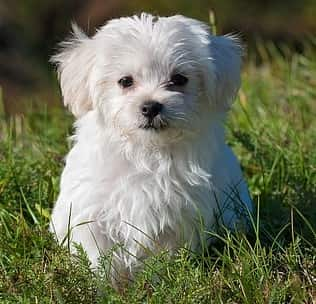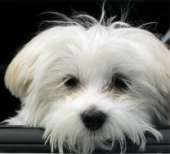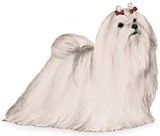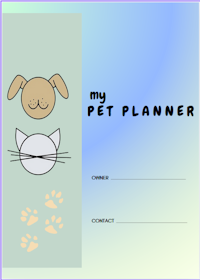Maltese Dog Breed
Highly Intelligent Toy Dog
The Maltese dog breed, was a long time resident of the island of Malta located in the Mediterranean Sea, and is believed to have first arrived there with Phoenicians who came as immigrants or traders.

Back in the day, this delightful dog was a frequent passenger on sailing
ships, providing company to sailors on long voyages, though it is hard
to image how its white coat would hold up under those conditions! That
being said, they are known to have a liking for jumping into puddles!
An aristocrat among dogs, this breed has a decidedly regal look about them and have always enjoyed
being pampered companion dogs.
The Maltese can be traced to ancient origins and was once a great
favorite of the wealthy and elite citizens of the Roman Empire. In
fact, they were frequently carried by ladies of the nobility in their
sleeves which led to another moniker as the Maltese Sleeve Dog.
Depictions of similar small dogs have been seen in Greek and Roman art from that time period, offering
evidence of its popularity.
At various times Maltese dogs have also been known as a Maltese "Terriers" and "Lion dogs", the latter of which is still heard quite often today. The breed's development is said to include very small spaniels and poodles, and it is assigned to the Toy Dog Group by the AKC.
The hallmark of the breed is without a doubt its attractiveness and luxurious coat of pure white hair that is silky in texture. It is not uncommon to see this sweet dog with its hair pulled up in ribbons, drawing attention to its large expressive eyes. It typically has quite a long life span - often in excess of 15 years.
Physical Stats and Grooming

Height: 9-10 inches
Weight: 4-6 pounds
Color: Solid white is the standard, though lemon color on the
ears is acceptable.
With its beautiful long white coat, this breed does deserve a daily brushing and frequent bathing to keep it free of mats and in good condition.
Good quality grooming tools, such as those made by
Chris Christensen Systems, are a must to avoid damaging
the coat. This Wood Pin Brush along with a coarse tooth butter comb are two basic essentials.
Brush from the skin line down, but avoid the brush making contact with
the delicate skin to avoid skin burn. Use of a leave-in de-tangling spray
helps enormously when dealing with mats and/or tangles. Ice on Ice is one that also conditions and has sunscreen.

If you notice any discoloration of the coat, this is
often due to a licking habit which some small dogs tend to develop. You can try using a specialty shampoo designed to restore the whiteness and relieve itching.
Some owners who don't plan to show their dogs, often have the coat
clipped shorter for easier maintenance in what is called a puppy cut.
The shedding of the coat is very minimal if it is well-maintained! This
feature may be a plus for allergy sufferers.
Because the Maltese dog has abundant hair around the face, eyes should be routinely inspected for any irritations, excess
tearing or staining. Regular cleaning with a gentle eye solution such as Arava Tear Stains Remover
is suggested and will help to keep them nourished and clean.
Characteristics of the Maltese Dog Breed

Extroverted with a fun attitude is one way to describe the Maltese dog breed. Despite their small size, these toy
dogs are not frail or delicate.
By nature, they quite adequately fit the bill as gentle, very sweet,
affectionate,
active and playful little dogs!
While Maltese dogs enjoy being coddled and pampered, too much of it can
lead to them expressing unwanted types of dominant behavior.
To be fair, most pet parents enjoy spoiling them, who wouldn't, but in
the long run it's best not to let them rule the roost.
When it comes to training, you hold the trump card as the Maltese dog
breed is very intelligent and likes to please his owner.
If you lather on the praise and make it fun, you can teach them almost
anything. They do very well and seem to enjoy learning tricks.
Another plus that pet owners enjoy, is that this breed is very clean by
nature and doesn't like to soil his space.
On the flip side, house training can be a little more challenging because they are a bit more fussy about the weather, so you may have to compromise occasionally by using training pads.
Activity Level of the Maltese
The Maltese dog breed does not need a lot of exercise because they are very playful and pretty active indoors most of the
time.
Even so, in the interest of good health, a regular short walk is still
needed for the mental stimulation and physical benefits it provides.
Ideal Living Space
Space is not an issue for this sweet little dog. He will adjust to almost any living conditions providing he can run about and get lots of attention.
That being said, a yard will always be a plus for potty breaks, play and training.
The Maltese Dog Breed And Children?
The Maltese can do well with young adults who are gentle and considerate around pets.
Just his small size alone would put him in jeopardy around little tots and he
has been known to run and hide from them to avoid confrontations.
Good For Retirees or Less Active Families?
The Maltese dog breed makes a really nice companion for retired or more sedentary families as long as they have the time to take care of grooming.
He can get along without a lot of exercise because he keeps himself pretty busy around the house. That being said, it's best if
someone is able to get him/her out daily even if only for brief walks.
Interested in adopting a rescue? Find our more at American Maltese Rescue



